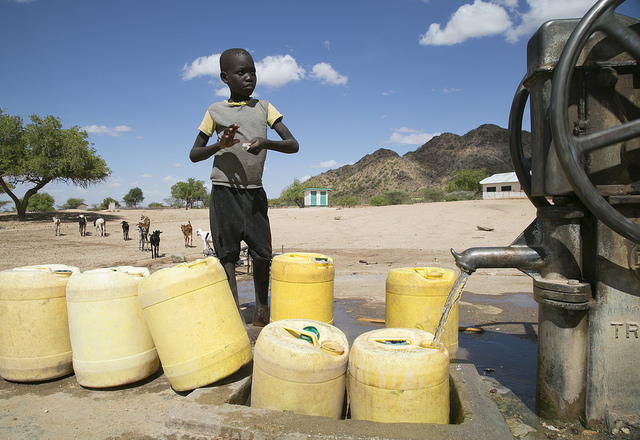Through its presence and participation, Caritas Internationalis called for stronger signs of political will at the High-level Political Forum (HLPF) on the Sustainable Development Goals (SDGs) which took place at the United Nations in New York from 10 to 19 July.
Governments issued a substantial ‘Ministerial Declaration’ at the end of the meeting, a report card highlighting areas of progress and where more effort needs to be made. The document recognizes that much more has to be done if we want to eradicate extreme poverty by 2030. Scaling up and involving all stakeholders, including the poorest living in the rural areas has been endorsed.

Caritas working with Catholic Church dioceses to support the County governments as they develop their capacities to sustainably tap and exploit precious water reserves in Kenya’s Arid and Semi-Arid Lands, or ASALs. Photo by Nancy McNally/Catholic Relief Services
“While global progress has been evident in many cases, it has been uneven across countries and regions and also insufficient across many targets,” said Amparo Alonso, head of Caritas Internationalis delegation to the United Nations in Geneva.
Altogether ten Caritas delegates from four regions participated in the forum. Delegates from Africa, North America, Europe, and Oceania called for engagement with civil society organisations to make more effective reviews of national progression towards the SDGs.
Caritas Sierra Leone and Caritas Kenya provided examples of meaningful engagement with governments to implement the SDGs on the ground.
However, such cooperation has often not been the case for many Caritas organisations, other civil society organisations, or faith-based organisations. Many called for effective partnership that moves beyond participation to engagement and collaboration. Amparo Alonso said, “Civil society with its outreach to communities and peripheries wants to be a significant enactor/partner of transformational change! We need political will for that and finances for implementation.”
On Goal 2, zero hunger, Caritas Kenya engages with the Kenyan government by sharing lessons learned from working with small scale farmers on how to grow crops amidst limited rainfall, and training them on how to retain water and how to avoid food waste by improving storage. Furthermore Caritas Kenya promotes the use of indigenous crops, which are more nutritious. Stephen Kituku, Director of Caritas Kenya, said: “We are working with the government and communities to educate them about alternatives which are personally healthy and economically fruitful and sustainable.”
Another focus of Caritas was Goal 14 which sets out to conserve and sustainably use the oceans, seas and marine resources for sustainable development.
Julianne Hickey, director of Caritas Aotearoa New Zealand, called for halting deep sea mining, noting degradation to one ocean is a degradation of all oceans and the environment. “Stewardship of the Pacific Ocean is especially important for this and future generations across the planet,” she said, recalling the words of St John Paul II, “the continued health of this and other oceans is crucial for the welfare of peoples not only in Oceania but in every part of the world.”
The SDGs were adopted two years ago. The 17 goals address poverty eradication and the economic, social and environmental dimensions of sustainable development.
